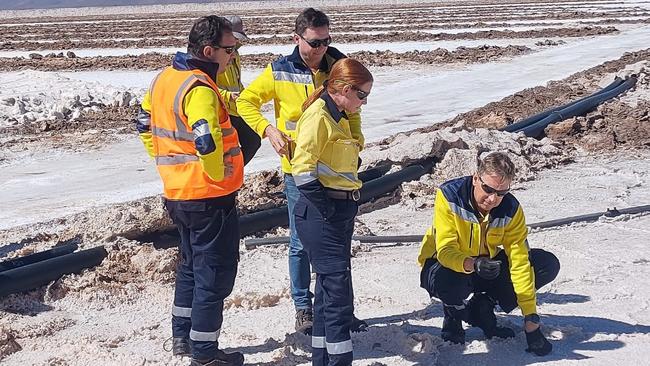Rio Tinto to spend $US2.5bn on Rincon lithium mine in Argentina
Rio Tinto will spend nearly $4bn on a new lithium mine in Argentina as it continues to show faith in future demand for the battery-making ingredient.
Rio Tinto has pulled the trigger on another big investment in lithium in Argentina as it continues to show faith in future demand for the battery-making ingredient and in South America’s capacity to surpass Australia as the world’s biggest supplier.
The Rio board approved spending $US2.5bn ($3.93bn) to expand the Rincon project, its first commercial-scale lithium operation, as foreshadowed by The Australian on Tuesday.
The latest investment comes as Rio closes in on the $US6.7bn acquisition of Arcadium Lithium and seeks a way forward with its $US2.4bn Yadar project in Serbia.
Rio said the investment in Rincon supported Argentina’s ambitions to become a world-leading lithium producer.
It noted Argentina’s economic reforms and the new Incentive Regime for Large Investments (RIGI) provide a favourable environment for investment, offering benefits such as lower tax rates, accelerated depreciation and regulatory stability for 30 years.
Rio, BHP and Glencore have all spoken positively about investment opportunities in Argentina under President Javier Milei and his RIGI policy, although BHP and Glencore have shown no interest in lithium.
Rio has set its sights on building three lithium brine super sites in Argentina, including Rincon and operations it will acquire through the Arcadium takeover.
It also has ambitions to build projects in South America and Canada that it will pick up from Arcadium, and has predicted sales of lithium could make up 13 per cent of its earnings over the longer term under plans to become less reliant on iron ore.

Arcadium, dual-listed in New York and Australia, moved in September to mothball its only mine in Australia, saying the operations had become unviable after a big drop in prices.
The future of the Mt Cattlin mine in Western Australia remains unclear.
The WA government last month unveiled a rescue package aimed at saving other hard rock lithium mines in the state that has produced more the half of world supply in recent years.
Rio has a huge exploration footprint near some of the existing hard rock mines in WA but has watched the struggles of New York-listed Albemarle and China’s Tianqi in trying to move downstream into processing of the spodumene concentrate produced in the state.
WA producers typically exports a 6 per cent or lower concentrate, which requires further waste removal and processing in China to turn it into lithium hydroxide. In contrast, brine operations produce lithium carbonate and are gaining favour as France’s Eramet and South Korea’s POSCO join Rio in expanding their footprint in Argentina. Rincon delivered first lithium from its 3000 tonne-a-year pilot plant at the end of November, about 32 months after Rio acquired the brine project for $US825m.
The $US2.5bn expansion is aimed at boosting capacity to 60,000 tonnes of battery-grade lithium carbonate a year at the project high in the Andes, where Rio has been emboldened by breakthroughs in direct lithium extraction (DLE) technology and water management.
DLE involves pumping brine to a processing plant where a resin, or adsorption material, is used to extract lithium so that there is no need for vast evaporation ponds.
CITI analysts noted DLE typically required higher capital expenditure but the technology could produce higher, better quality volumes from a much smaller footprint, and with water use advantages.
Rincon’s mine life is expected to be 40 years, with construction of the expanded plant scheduled to begin in mid-2025 if Rio receives the necessary permits.
First production from the new plant is expected in 2028, followed by a three-year ramp-up to full capacity, with Rio banking on the lithium market growing fivefold by 2035.
Rio minerals CEO Sinead Kaufman said Argentina’s policy changes provided clarity on taxes and royalties, and the ability of big investors make money.
Ms Kaufman said Australian had been an early mover in lithium mining whereas Argentina was coming off a low base and Canada was also playing catch-up. “Argentina is realising that they have some fantastic resources,” she said. “They’ve made great strides in positioning themselves as a world leading lithium producer. “And I think their economic reforms with RIGI definitely encourage large investments.”
Rio CEO Jakob Stausholm said the attractive long-term outlook for lithium driven by the energy transition underpinned the latest investment in Rincon. “We are dedicated to developing this tier 1, world-class resource at scale at the low end of the cost curve,” he said. “Building on Argentina’s supportive economic policies, skilled workforce and exceptional resources, we are positioning ourselves to become one of the top lithium producers globally.”
He said the investment would make lithium one of the key pillars of Rio’s portfolio for decades.



To join the conversation, please log in. Don't have an account? Register
Join the conversation, you are commenting as Logout